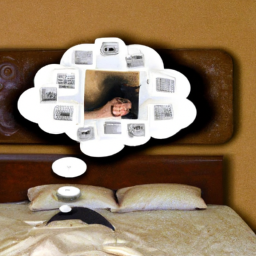I have always been intrigued by dreams. They can be intense, otherworldly, and at times completely strange. But what happens when you struggle to remember them? This is a common occurrence for a lot of individuals, myself included, and it can be quite frustrating not to be able to recollect the content of our dreams.
In this article, I’ll explore the importance of dream recall, how dreams work, and the possible reasons why we might not remember our dreams. I’ll also discuss techniques to improve dream recall, lucid dreaming, dream interpretation, and how we can use our dreams for self-discovery and personal growth.
Dreams can be a window into our subconscious mind, revealing our deepest fears, desires, and emotions. They can also be a source of inspiration, providing us with creative ideas and solutions to problems we face in our waking lives. However, not being able to remember our dreams can be a roadblock to accessing this valuable information.
In this article, I’ll share my own experiences with dream recall and offer tips and strategies for improving it. Whether you’re a seasoned dreamer or someone who rarely remembers their dreams, there’s something here for everyone. So, let’s dive in and explore the fascinating world of dreams!
Key Takeaways
- Not remembering dreams is common and does not necessarily indicate any underlying health issues.
- Dream recall is influenced by sleep quality and timing of waking up, as well as stress and anxiety levels.
- Keeping a dream journal and setting an intention before sleep can improve dream recall.
- Dreams play an important role in memory consolidation, learning, problem-solving, and creativity.

Dream Journal: Dream record diary and improved recall log book | Simple interpretation, thoughts and reflection dreaming book | Professional black cover design
As an affiliate, we earn on qualifying purchases.
As an affiliate, we earn on qualifying purchases.
The Importance of Dream Recall
If you can’t remember your dreams, you’re missing out on a fascinating and mysterious world that your mind creates while you sleep. Dream recall is important because it allows you to access this world and explore your subconscious mind.
Dreams can provide insight into your thoughts, emotions, and experiences, and can even offer guidance or solutions to problems in your waking life. In addition, remembering your dreams can improve your overall sleep quality.
Research has shown that people who remember their dreams are more likely to wake up feeling rested and refreshed. This is because dreaming is an important part of the sleep cycle, and if you’re able to recall your dreams, it indicates that you’re getting enough deep, restorative sleep.
So, if you’re having trouble remembering your dreams, it’s worth putting in some effort to improve your dream recall. Now let’s explore how dreams work and why some people struggle to remember them.

LC-dolida Sleep Headphones, 3D Sleep Mask Bluetooth Wireless Music Eye Mask, Sleeping Headphones for Side Sleepers Sleep Mask with Bluetooth Headphones Ultra-Thin Stereo Speakers Perfect for Sleeping
【Sleep Headphones & Bluetooth Sleep Mask & Sleep Eye Mask 3 in 1】LC-dolida sleep mask with bluetooth headphones…
As an affiliate, we earn on qualifying purchases.
As an affiliate, we earn on qualifying purchases.
How Dreams Work
I’ve always been fascinated by the way our brains work while we sleep. Did you know that there are different stages of sleep, each with their own unique characteristics?
During these stages, our brains are busy processing memories and consolidating information. In fact, dreams play an important role in this process, helping us to store and retrieve memories more effectively.
The Different Stages of Sleep
You may be interested to know that during the REM stage of sleep, which is the stage where most dreaming occurs, your brain activity is similar to that of when you’re awake.
This is because the brain is highly active during this stage, with increased electrical activity and blood flow to the brain, as well as heightened levels of neurotransmitters such as serotonin and acetylcholine.
It is during this stage that the brain is actively processing and consolidating memories, which is why dreams are often thought to be linked to memory.
The role of dreams in memory consolidation isn’t fully understood, but many researchers believe that it may be an important mechanism for processing and integrating new information.
Dreams may help to strengthen neural connections, establish long-term memories, and even aid in problem-solving and creativity.
So even if you can’t remember your dreams, they may still be playing an important role in your brain’s ability to learn and remember new things.
The Role of Dreams in Memory Consolidation
The potential impact of dreams on memory consolidation is a subject of ongoing research, with many scientists suggesting that this nocturnal brain activity may play a crucial role in our ability to learn and retain new information.
During sleep, the brain processes and consolidates memories from the day, with some research indicating that dreams are a key component of this process.
Studies have shown that individuals who are deprived of REM sleep, the stage in which most dreams occur, experience difficulty retaining new information.
While the exact mechanisms behind the relationship between dreams and memory consolidation are not fully understood, there are several theories.
One is that dreams help to strengthen the connections between neurons, leading to more efficient retrieval of information.
Another is that dreams help to filter and prioritize important memories for long-term storage.
Understanding the role of dreams in memory consolidation may shed light on why we dream and the importance of getting enough quality sleep.
This leads us to the next section about the science behind dream recall.

12,000 Dreams Interpreted: A New Edition for the 21st Century
As an affiliate, we earn on qualifying purchases.
As an affiliate, we earn on qualifying purchases.
The Science Behind Dream Recall
Dream recall is influenced by various factors such as sleep quality and the timing of waking up. When we wake up during the Rapid Eye Movement (REM) stage of sleep, we are more likely to remember our dreams. This is because our brain is more active during this stage, which is when most of our dreaming occurs. On the other hand, if we are abruptly awakened during non-REM sleep, we may not remember our dreams at all.
Additionally, certain medications and substances can affect dream recall. For example, alcohol and marijuana have been found to decrease dream recall, while some antidepressants can increase it. Stress and anxiety can also affect our ability to remember dreams. When we are under high levels of stress, our brain may prioritize other tasks over storing dream memories.
Possible reasons for not remembering dreams include sleep deprivation, irregular sleep patterns, and not giving enough attention to dream recall. It’s important to note that not remembering dreams is normal and does not necessarily indicate any underlying health issues. However, if you consistently have trouble remembering your dreams, it may be worth exploring techniques for improving dream recall, such as keeping a dream journal or practicing relaxation techniques before bed.

Free Shark Smart Ring with Sleep Monitoring, Step Counting, Heart Rate, Blood Oxygen for iOS and Android, No Subscription Fee, IP68 Waterproof Health Tracker (Silver, 8)
【Check the Size Before Purchase】 Before buying the Free Shark Smart Ring, we strongly suggest that you refer…
As an affiliate, we earn on qualifying purchases.
As an affiliate, we earn on qualifying purchases.
Possible Reasons for Not Remembering Dreams
Sometimes, it feels like you wake up from a deep, dark void with no memory of what happened, but there are reasons why this happens.
One possible reason for not remembering your dreams is simply not getting enough sleep. When we’re sleep deprived, our brain tends to prioritize deep sleep over REM sleep, which is the stage of sleep where most dreaming occurs. As a result, we may not be spending enough time in REM sleep to have vivid dreams that we can remember.
Another reason for not remembering your dreams could be attributed to certain medications or substances. Certain medications, such as antidepressants or anti-anxiety medications, can suppress REM sleep and subsequently affect our ability to remember our dreams. Similarly, consuming alcohol or marijuana before bed can interfere with our brain’s ability to form and store memories, including memories of our dreams.
Knowing these reasons can help us understand why we may not remember our dreams and make changes to our lifestyle to improve our dream recall. Speaking of which, let’s explore some techniques to improve dream recall.
Techniques to Improve Dream Recall
Previously, we discussed some possible reasons for why you might not be able to remember your dreams. However, if you’re someone who wants to start remembering your dreams, there are some techniques that you can try to improve your dream recall.
One technique is keeping a dream journal. As soon as you wake up, write down everything you can remember from your dreams. Even if it’s just a few words or images, recording these details can help you start to remember more and more about your dreams over time.
Another technique is setting an intention before going to bed. Before you fall asleep, tell yourself that you want to remember your dreams when you wake up. This can help your subconscious mind focus on your dreams and make them more memorable.
As you start to remember your dreams more often, you may become interested in exploring the world of lucid dreaming. Lucid dreaming is when you become aware that you are dreaming and can then control the dream.
In the next section, we’ll discuss some tips for how to start lucid dreaming.
Lucid Dreaming
Get ready to experience a whole new level of dreaming with lucid dreaming. This is a technique where you become aware that you’re dreaming and can control the content of your dreams. It can be an exhilarating experience, as you have the power to shape your dream world and make it even more exciting and fulfilling.
Lucid dreaming can be achieved through various techniques, such as reality checks, meditation, and keeping a dream journal. Once you become aware that you’re dreaming, you can start to manipulate the dream world by flying, teleporting, or interacting with dream characters.
However, it’s important to note that lucid dreaming requires practice and patience, and it may not happen every time you sleep. With time and effort, you can become skilled at controlling your dreams and experiencing a new level of consciousness.
Now, let’s move on to the next section and explore the fascinating world of dream interpretation.
Dream Interpretation
I find dream interpretation to be a fascinating topic, as our dreams can reveal so much about our subconscious thoughts and emotions.
When it comes to understanding common dream symbols, it’s important to remember that these symbols can have different meanings depending on the context of the dream.
While it can be helpful to explore dream symbolism on your own, seeking professional help can provide deeper insight and understanding.
Understanding Common Dream Symbols
Dreams can be full of symbols that leave me feeling confused or overwhelmed. Sometimes I’ll have a dream that seems so vivid and real, yet when I wake up, I can’t quite put my finger on what it was trying to tell me. One way to make sense of these symbols is to understand their common meanings.
Here are some examples:
- Water: often represents emotions and the subconscious mind.
- Teeth falling out: can symbolize a loss of power or control.
- Flying: can indicate a sense of freedom or rising above a situation.
- Being chased: can represent a fear or anxiety that needs to be addressed.
- Snakes: often symbolize transformation or change.
Understanding these symbols can help me interpret the meaning behind my dreams. However, it’s important to remember that the context of the dream is crucial in deciphering its message.
The importance of context in dream interpretation cannot be overstated. While the above symbols may have general meanings, the way they appear in my dream may have a unique significance based on the context. For example, if I dream of flying but am afraid of falling, the symbol may represent my desire for freedom but fear of taking risks. Therefore, it’s important to take into account the specific details and emotions present in my dream to truly understand its message.
The Importance of Context
Picture yourself in a dense forest, where every tree and leaf plays a vital role in what your dream’s trying to convey. Now imagine being unable to remember any of it. For some people, this is a common occurrence. They wake up with a blank slate, no recollection of the strange or vivid dreams they had the night before.
However, it’s important to note that the context in which we experience our dreams is just as crucial as the content itself.
The context of our dreams can provide insight into our waking lives, including our emotional state, stress levels, and subconscious desires.
Without this context, it can be difficult to understand the significance of our dreams. If you find yourself consistently unable to remember your dreams, seeking professional help from a therapist or sleep specialist may be beneficial in understanding and unlocking the hidden messages behind your dreams.
Seeking Professional Help
As I mentioned earlier, context is crucial when it comes to interpreting dreams. However, what if you can’t even remember your dreams? This was a problem I faced for a long time, and it left me feeling frustrated and disconnected from my subconscious mind. I couldn’t help but wonder if I was missing out on valuable insights and messages from my dreams.
If you’re in a similar situation, it may be worth seeking professional help. There are a number of reasons why you might not be able to remember your dreams, ranging from sleep disorders to medication side effects. By consulting with a doctor or therapist, you can work to identify the root cause of the issue and develop strategies for improving dream recall.
- Keep a dream journal by your bed to record any fragments or impressions upon waking
- Create a regular sleep schedule and prioritize getting enough rest
- Practice mindfulness and relaxation techniques before bed to reduce stress and anxiety levels
With the help of a professional and some diligent effort on your part, it’s possible to start remembering your dreams again and tapping into their potential for self-discovery.
In the next section, we’ll explore some ways to use your dreams as a tool for personal growth.
Using Your Dreams for Self-Discovery
You can dig deeper into your subconscious by exploring the symbolism and emotions present in your dream experiences. Dreams are often a reflection of our innermost thoughts and feelings, and by examining them, we can gain valuable insight into ourselves.
For instance, if you frequently dream about being chased, you may be experiencing anxiety or fear in your waking life that you need to address. Alternatively, if you dream about water, it could represent your emotions or the flow of your life.
By paying attention to your dreams and interpreting them, you can use them as a tool for self-discovery and personal growth. This process is known as dreamwork, and it involves exploring the themes and symbols present in your dreams to gain a better understanding of yourself and your emotions.
Incorporating dreamwork into your daily life can help you lead a more fulfilling and authentic existence by enabling you to recognize and work through any unresolved issues that may be holding you back.
Incorporating Dreamwork into Your Daily Life
Incorporate dreamwork into your daily routine like a habit, and before you know it, your dreams will be like a trusted friend guiding you towards a more fulfilling life.
One way to start is by keeping a dream journal beside your bed and writing down your dreams first thing in the morning. Even if you can’t remember much, jot down any details or emotions that come to mind. Over time, this practice will help you remember more of your dreams and gain deeper insights into your subconscious.
Another way to incorporate dreamwork into your daily life is by reflecting on your dreams throughout the day. Take a few moments to think about any symbols or themes that stood out to you and how they might relate to your waking life.
You can also try meditating or visualizing your dreams to gain a deeper understanding of their meaning. By making dreamwork a regular part of your routine, you’ll be able to unlock the powerful wisdom of your subconscious mind and live a more fulfilling life.
Frequently Asked Questions
Can medications or substances affect dream recall?
Medications and substances can definitely affect dream recall. Personally, I’ve noticed that certain medications make it harder for me to remember my dreams. It’s important to talk to your doctor if you’re concerned about this.
Is there a correlation between age and dream recall?
Do dreams fade as we age? Yes, there is a correlation between age and dream recall. As we get older, our ability to remember dreams decreases. However, keeping a dream journal or practicing lucid dreaming can improve recall.
Can certain mental health disorders impact dream recall?
Certain mental health disorders, such as depression and anxiety, can impact dream recall. Stress and medication can also affect dream memory. It’s important to discuss any concerns with a healthcare professional.
What role does sleep quality play in dream recall?
Sleep quality is a crucial factor in dream recall. When I sleep well and without interruption, I am more likely to remember my dreams. On the other hand, poor sleep can lead to a lack of dream recall.
Are there any potential negative effects of actively trying to improve dream recall?
Actively trying to improve dream recall can lead to increased awareness and lucidity in dreams. However, it may also cause sleep disruption and fatigue. I once stayed up late journaling my dreams and felt exhausted the next day.
Conclusion
Well folks, that’s all she wrote. It’s safe to say that dream recall is an important aspect of our subconscious mind. Understanding the science behind dream recall and exploring different techniques to improve it can have endless possibilities.
Even though we may experience moments where we can’t remember our dreams, it doesn’t mean they aren’t happening. It’s up to us to tap into our inner dream world and utilize it for self-discovery and personal growth.
Incorporating dreamwork into our daily lives can be a game-changer. Who knows? Maybe we’ll unlock the secrets of our subconscious and discover something life-changing. It’s like finding a hidden treasure chest full of profound knowledge and insights.
So go ahead, grab your dream journal and explore the depths of your mind. The possibilities are endless and the sky’s the limit. Dream on, my friends!









